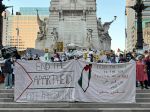YANGON, Myanmar. — Troops in Myanmar have occupied hospitals and university campuses and ramped up nighttime raids ahead of a nationwide strike to protest against the military coup, according to local media reports.
It’s the latest move by the military junta, which seized power on February 1, to consolidate its control of the country in the face of mass protests and resistance to its increasingly violent rule. More than 54 people have died in crackdowns on protests, including many teenagers and young people, according to the United Nations.
In many districts of the biggest city, Yangon, on Saturday and Sunday, witnesses reported sounds of gunfire and stun grenades. Terrified residents watched and filmed as security forces raided residential areas in the city and made several nighttime arrests. Residents told Reuters police fired shots and did not give reasons for the arrests, which continued into the early hours of Sunday.
One of those detained in the raids Saturday was a party official from Aung San Suu Kyi’s National League for Democracy (NLD). Khin Maung Latt died while in custody, according to advocacy group Assistance Association for Political Prisoners (AAPP) and Reuters.
“On the night of his arrest, Khin Maung Latt was tortured to death in his cell,” AAPP said in a news release Sunday. Reports of bruising to Khin Maung Latt’s head and body raised suspicions he had been abused, NLD lawmaker Ba Myo Thein told Reuters.
CNN cannot independently verify this reporting and the details surrounding Khin Maung Latt’s death are not immediately clear.
Khin Maung Latt had worked as a campaign manager for one of two Muslim lawmakers elected in 2020. Mourners gathered for his funeral on Sunday in Yangon.
Hospital occupation fears
Over the weekend, Myanmar troops were seen occupying hospitals and universities in Yangon and Mandalay, according to local media Myanmar Now. Activists fear their presence could hinder treatment for wounded protesters or enable arrests.
An official at the UN Office of the High Commissioner for Human Rights (OHCHR) said that at least five hospitals were being occupied Monday.
“We have received credible reports of hospitals being occupied in Myanmar today, including at least four hospitals in parts of Yangon and at least one other in Mandalay,” said James Rodehaver, chief of OHCHR’s Myanmar team.
“Such activity is completely unacceptable. Hospitals are locations under the protection of international humanitarian law.”
On Monday, international group Physicians for Human Rights condemned the “invasion and occupation of public hospitals and wanton excessive force against civilians.”
“If it was not obvious before, it is absolutely clear now: the Myanmar military will not stop violating the rights of the people of Myanmar until the international community acts decisively to prevent and account for these outrageous acts,” the group said in a statement.
Physicians for Human Rights said the military’s occupation of hospitals was “a violation of international law — which only serves to further undermine a health care system already embattled by the Covid-19 pandemic and by the military’s recent coup d’état.”
“This widespread siege of hospitals follows several days of prominent civilian injuries and casualties, and can be interpreted as a direct attempt to impede access to care for civilians,” said a statement from Sandra Mon, of the Center for Public Health and Human Rights at Johns Hopkins Bloomberg School of Public Health.
“It is also a threat to attending medics to warn them against further treating injured protestors. The Myanmar military has impunity despite their intentional acts of nighttime terror. We may be seeing a nationwide upsurge in military retaliation against peaceful protestors and medics in the days to come.”
Since the coup, security forces have repeatedly targeted medical workers, many of whom were the first to lead the civil disobedience movement. Last week, police and military personnel were filmed forcing three medical charity workers from their ambulance before brutally beating them with their guns and batons. And there have been cases where hospital staff have gone into hiding after the military demanded wounded protesters be transferred to a military hospital.
Myanmar’s police force said security forces are “maintaining” various universities and hospitals throughout the country “for the benefit of the people,” state-run newspaper Global New Light of Myanmar reported.
Myanmar labor unions called for a nationwide strike Monday, as part of a civil disobedience campaign against the coup. Eighteen unions of major industries including agriculture, energy, mining, construction, food, and transportation have called for a “full-extended shutdown of Myanmar economy.”
“The labor organizations of Myanmar stand united in support of an extended nationwide work stoppage against the military coup and for the future of Myanmar democracy,” a joint statement read. “No one can force any Myanmar citizen to work; we are not slaves to the military junta now and we never shall be.”
Meanwhile, women’s groups have called for people to turn out Monday to mark International Women’s Day, and “fly” their Htamains (sarongs) as part of the anti-junta movement. Images showed women marching with their Htamains flying like flags behind them, or hung across streets in front of barricades.
As protests continued Monday, at least two people died in the northern city of Myitkyina after police opened fire on protesters, according to Reuters who cited witnesses. Several others were injured in the violence.













